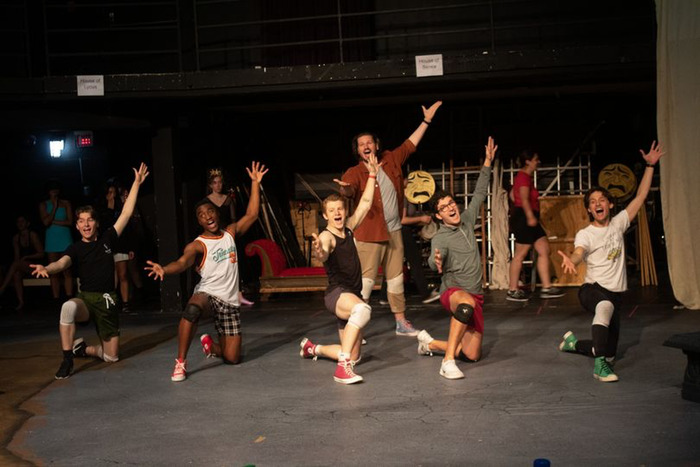
A Funny Thing Happened on the Way to the Forum (or A Funny Thing for short), which is now on stage at Kent State University’s Porthouse Theatre on the grounds of Blossom Center, is a musical comedy/farce with music and lyrics by Steven Sondheim and book by Burt Shevelove and Larry Gelbart.
Its Broadway run earned it numerous awards, including a 1962 Tony for Best Musical. But truth be told, the production almost didn’t make it to the Great White Way.
The story goes that during out-of-town tryouts, the show attracted little business and did not play well. Jerome Robbins, who was often brought in to “save” musicals, was contracted to give advice and make changes. He quickly realized that the opening number, “Love is in the Air,” set up the audience to expect a lovely, love story. A Funny Thing, though it contains lots of love stories, is a comedy, a gay romp or a farce, intended to be a bigger-than-life laugh-fest.
Robbins had Sondheim introduce the show as a bawdy, wild comedy by writing the song “Comedy Tonight” as new opening number. After the new opening was added, the audience had a psychological adjustment, changed emotional gears, and had one hell of a good time. A Funny Thing Happened on the Way to the Forum opened in May of 1962 and ran for 964 performances.
The tale, inspired by the immoral farces of ancient Rome written by Plautus, tells the story of a slave named Pseudolus and his attempts to con his way to freedom by helping Hero, his young master, to woo a mentally challenged beautiful young virgin, whose only claim to fame is that, as she sings, she is “Lovely.”
The plot displays many classic elements of farce, including puns, the slamming of lots of doors, cases of mistaken identity and satirical comments on social class, sex and male-female relationships. The title derives from a line often used by vaudeville comedians to begin a story: “A funny thing happened on the way to the theater.”
Interestingly, Zero Mostel, a Yiddish theater actor who basically made his Broadway reputation from his cross-eyed, double-talking, lecherous interpretation of Pseudolous, was not the first choice to play the role. The show’s creators wanted Phil Silvers, but he turned them down, supposedly because he would have to perform without his glasses, and his vision was so poor he feared tripping into the orchestra pit.
“In ancient Rome, some neighbors live in three adjacent houses. In the center is the house of Senex, who lives there with wife Domina, son Hero and several slaves, including head slave Hysterium and the musical’s main character Pseudolus. A slave belonging to Hero, Pseudolus wishes to buy, win or steal his freedom. One of the neighboring houses is owned by Marcus Lycus, who is a buyer and seller of beautiful women; the other belongs to the ancient Erronius, who is abroad searching for his long-lost children (stolen in infancy by pirates).”
“One day, Senex and Domina go on a trip and leave Pseudolus in charge of Hero. Hero confides in Pseudolus that he is in love with the lovely Philia, one of the courtesans in the House of Lycus (albeit still a virgin). Pseudolus promises to help him win Philia’s love in exchange for his own freedom. Unfortunately (as the two find out when they pay a visit on Lycus), Philia has been sold to the renowned warrior Miles Glorious [he of glorious body and even larger ego], who is expected to claim her very soon. Pseudolus, an excellent liar, uses Philia’s cheery disposition to convince Lycus that she has picked up a plague from Crete, which causes its victims to smile endlessly in its terminal stages.”
Let the chaos begin!
And of course, this is farce, not a Greek tragedy, so a happy ending prevails for all
Farce…farce…and more farce. That’s the clue to making the comedic elements of the script work. To accomplish this takes a couple of vital elements. First, the choreography must be dynamic, with lots of overdone movements, a great variety of moods and methods, and high energy.
Porthouse is lucky to have Martin Céspedes, multi-award winner of Cleveland Critics Circle and Broadwayworld accolades. The dancing is dynamic, bringimg about spontaneous applause from the audience with every show-stopper — and there are many.
Second, the director has to keep the whole thing moving along and help develop consistent characterizations. Terri Kent did her job.
Third, Pseudolus must be a master of farce. (Think Zero Mostel. Think Jason Alexander.) Dylan Ratell has nice comedy chops, but he is not a farce-master. He gets lots of polite laughs, but hysterical he is not. He needed to be.
Much of the rest of cast nicely develops their roles. Tim Culver, Hysterium, does farce like farce should be played — with realistic abandonment. “I’m Calm” and his reprise of “Lovely” got the response from the audience that should have been present during the whole show from all.
Anthony Ghali makes for a properly naïve Hero. Joseph Ball has some good moments as Marcus Lycus. Allison Sheski is “lovely, absolutely lovely” as Phila. Rohn Thomas milks every bit of ridiculousness out of the role of Erronius.
Jennifer Korecki’s nicely tuned orchestra could have used a little more “oomph” to keep the goings on moving along. Victoria Mearini’s costumes were era-correct.
CAPSULE JUDGMENT: There is “Comedy Tonight” at Blossom. Maybe a little more abandonment by some in the cast might have been desired, but it appeared the audience was having a great time and, that’s what this type of show should illicit — unabashed enjoyment.
A Funny Thing Happened on the Way to the Forum runs through June 24. For tickets go to kent.edu or 330-672-3884. Next up at Porthouse is The Marvelous Wonderettes (June 30-July 15) followed by The Prom (July 21-August 6).